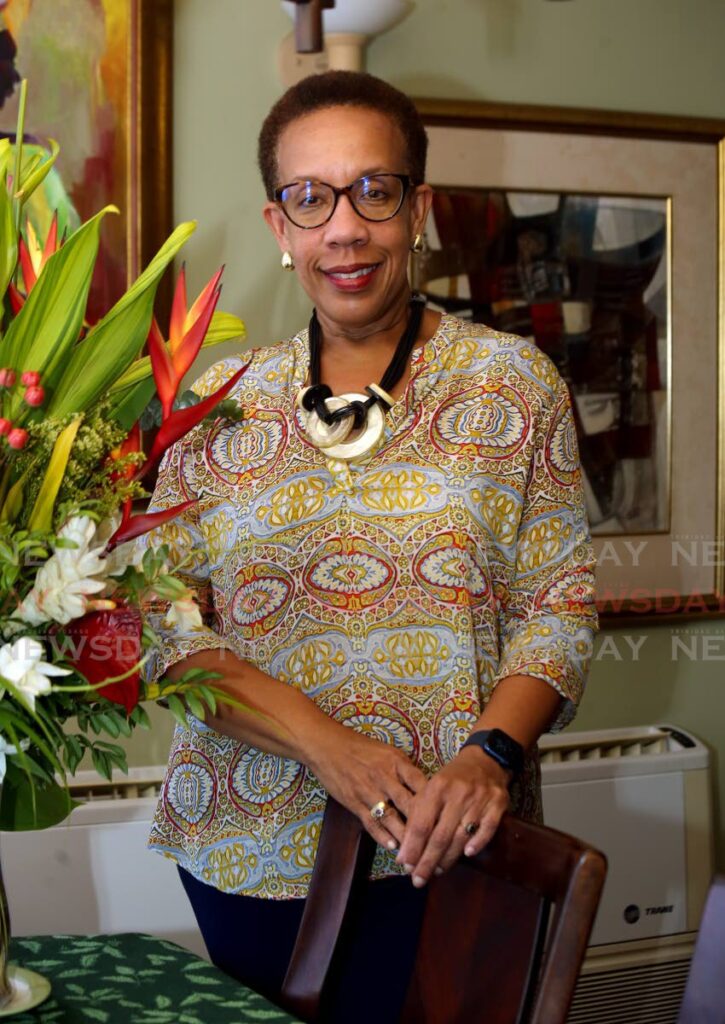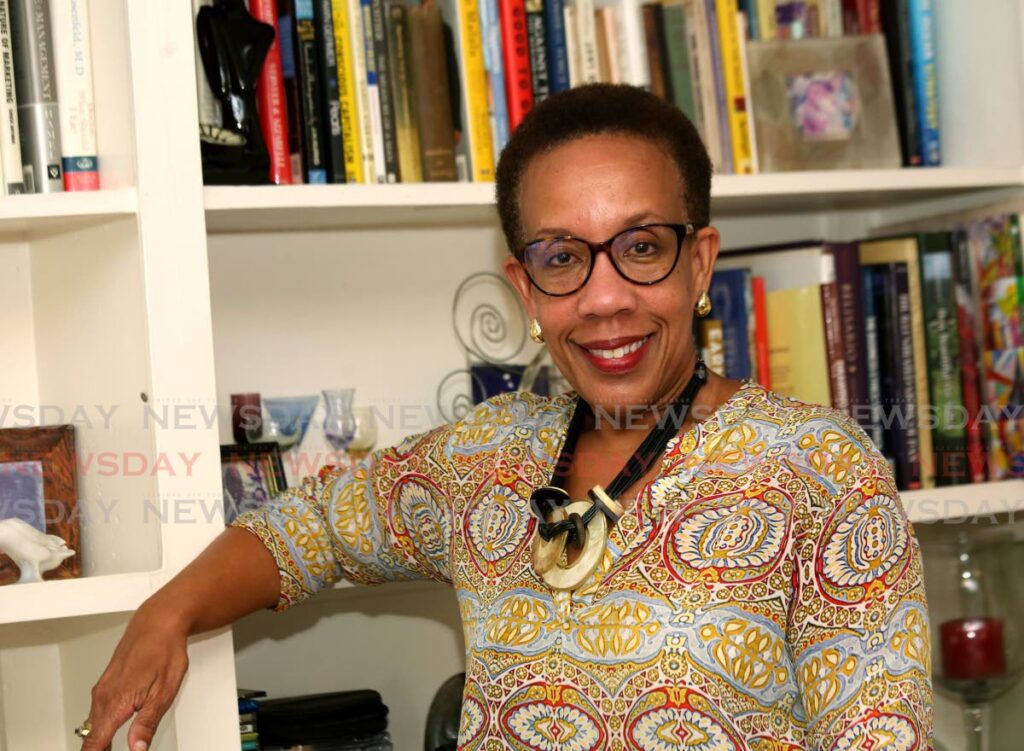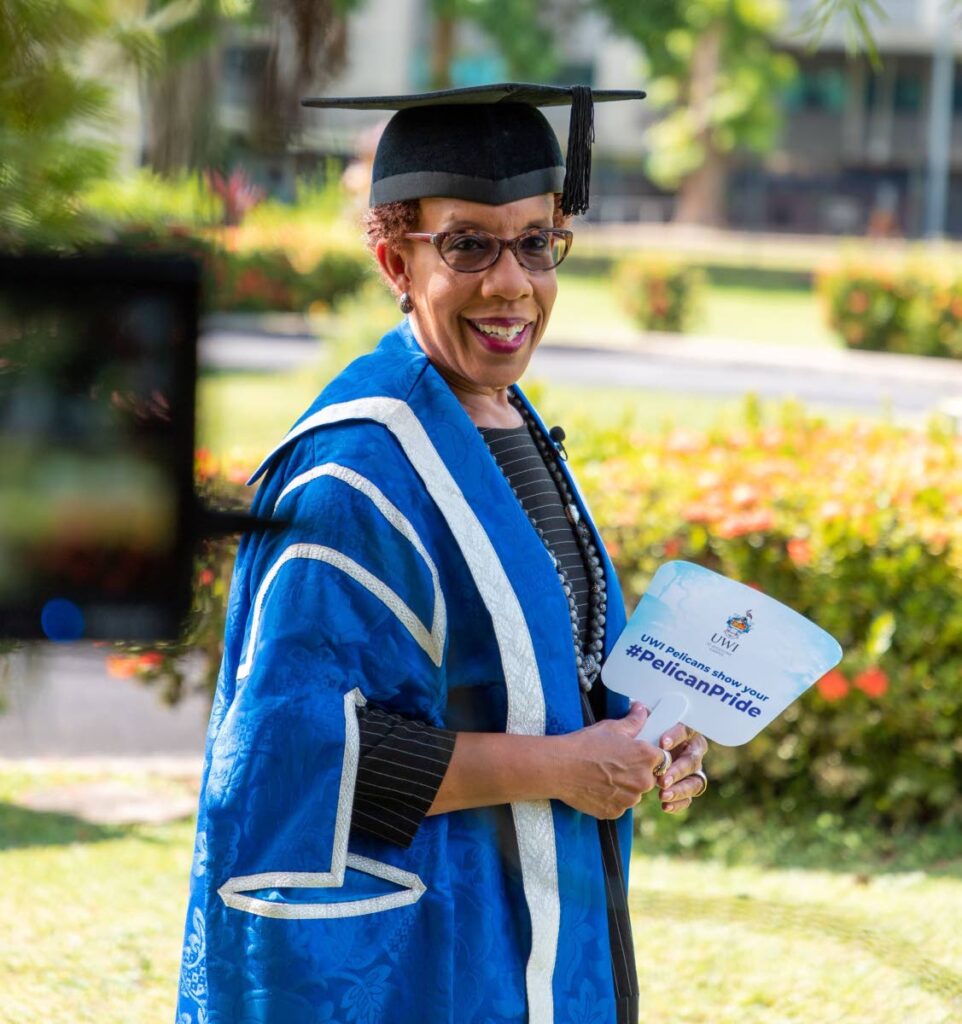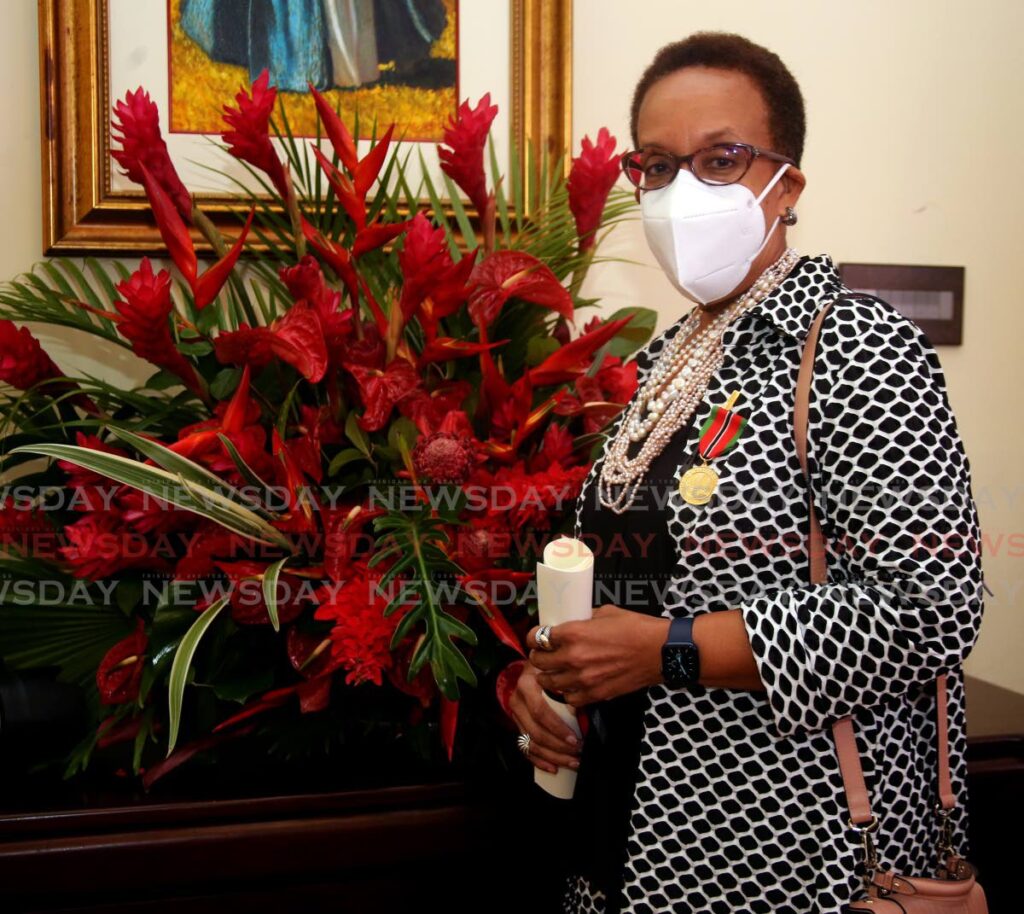Sharon Christopher, attorney who became a leader in Trinidad and Tobago banking

Sharon Christopher has had three different careers. She’s an attorney, she has worked in banking and finance, and now she is the founder and CEO of Sharon Christopher and Associates, focusing on leadership development, motivational speaking and personal/life coaching.
Christopher’s contributions to the business, banking and finance sectors have been numerous, and earlier this month she was recognised for it with the Chaconia Medal (Gold), one of Trinidad and Tobago’s highest awards.
“I was honoured to think that my work has been recognised on a national level… I mean, you work and you don’t necessarily work for people to honour you, because my real joy is doing the work and seeing that things come out how I envisioned them to be… But it is a privilege to be so honoured and it’s a humbling, beautiful feeling,” the former deputy CEO of First Citizens Bank told Business Day at her home in Westmoorings.
Christopher was born in Grenada and is a naturalised citizen of TT. She grew up in Alyce Glen, Petit Valley. She retired from corporate life in 2016, but said when she started off professionally she was an attorney, and had no formal training in business. What she had was a willingness to learn and people to teach her as she went along. She holds a bachelors of law degree from the UWI Cave Hill, Barbados campus.
“My professional career started when I came back from London after doing a masters in law at the London School of Economics and Political Science.
"I came back at that time when Selwyn Richardson, God rest his soul, was attorney general…I was brought in to work as a state counsel II, and there began five of the most exciting years of my life,” from 1981-1986.
When Russell Martineau, SC, succeeded Richardson, Christopher said he, like Richardson, became a legal mentor. Martineau assigned her to the international finance desk, which was out of her litigation comfort zone.

“This meant I had to travel with the Ministry of Finance. The country was undergoing major infrastructure works at that time and was borrowing heavily on the international markets. I would go and give legal advice.”
When she was first assigned there she was hesitant because she was “a new lawyer.”
But Martineau said, "You’re a lawyer, and you can do it. You go there and if you sit at the negotiation table and you get stuck on a point, you tell them to stop, you get back to your hotel, you call me and we discuss it.’”
Christopher said it was one of the most important lessons she has learnt in her career, and she is fortunate to do so at such an early stage in the game. It’s a lesson she tries to teach her clients, especially the women.
“When you face your fears, a whole world opens up to you.”
When she left the government service to work at the Central Bank, she said, it was not because she wanted to, but because she had to do what was necessary to take her life in the direction she wanted it to go.
“I wanted to buy a house and couldn’t afford in the AG’s chambers. We didn’t really have benefits, just a flat salary. At Central Bank, the salary wasn’t much better, but they gave you a two per cent mortgage, and I needed that to afford a home.”
A year later, after working at the Deposit Insurance Corporation – established by the Central Bank, Christopher moved into her own home. But the ground was shifting in her professional space.
“The financial system started to collapse in TT. We had gone from a boom to a bust, and a lot of the non-bank financial institutions crashed…Workers Bank was the first commercial bank that was closed, and I agreed to go there to manage the legal ramifications.”
She and a team began restructuring the bank, and without warning, she found herself involved in areas that were not strictly about law.
“I didn’t have formal training in business, but you can learn anything…When I first went into Workers Bank I had never worked with a union, I didn’t understand any aspect of HR management.”
But there were people who were willing to help her develop in those areas.
“And then every other thing that came under me, I just learnt it.”

She said in 1993 a decision was taken to merge Workers Bank and the two other indigenous banks – National Commercial Bank and Trinidad Co-operative Bank – to form First Citizens Bank.
“When we started, I was corporate secretary for the bank and subsidiaries. I was the head of legal…I ended up as deputy CEO in operations and administration of the group.”
But for all the work that she put into helping build the bank into something everyone could be proud of, Christopher described the scandal that rocked the 2014 initial public offering (IPO) as the lowest point in her professional life.
In 2013 the bank launched its IPO listing 20 per cent of its shares on the TT Stock Exchange. It soon became shrouded in scandal when news broke that a former executive used the special tranche offered to staff to purchase $14 million worth of shares for a relative and subsequently transferred those shares via a local brokerage firm. This was considered to be an example of insider trading, marring the otherwise successful IPO.
“When FCB started, it was considered the worst bank in the country. It was bleeding millions in deposits. We used to have a joke that we would sell anything that was not bolted down, because we had to get money to be able to pay the depositors when they came and said they wanted their money.
"We also faced a situation in which there was a belief in the country that black people shouldn’t be in the business of banking. And by black, I mean people of colour. People don’t like me saying it, but that doesn’t make it any less true.”
She said she recalled then Minister of Finance Larry Howai saying, “We need to stand on the shoulders of those who have gone before and build this,” and she bought into it because she saw its potential to get to the stage where the bank would go back to the people.
But when it did happen, everything did not unfold in the way she had envisioned.
“We built that bank into something that when government decided to sell 20 per cent on the market, the issue was oversubscribed. People were fighting for our shares…and then the following year, to find out that people were inside of the IPO…people who were not even around when we were in the battle – and that is why that was the lowest point in my career.”

She said it was unfortunate that she became the scapegoat and an entire campaign was mounted to try to destroy her publicly. But she was weathered the storm through the kindness of the people of TT, support from family and friends, her faith in God and her beliefs and affirmations.
“My father always used to say, you can’t keep cork underwater. When you stand in your truth, nobody can hold you down. He also used to say 'cow horn never too big for he head,' meaning when things come against you, it’s never more than you can handle.”
She said one of the things that irk her about TT is the “nastiness” some people exhibit.
“You don’t have to agree with people politically, religiously, culturally, socially, but everybody deserves to be respected and loved. Why are we moving away from that? We are forgetting how to love one another, how to exist in a good space.”
But Christopher has not allowed that experience to prevent her from claiming the space she believes she was born to occupy. Since her retirement, she continues to work in areas where she thinks she can make a difference. She said it is her life mission to advocate for women.
In addition to her many other duties, she is the chair of the UWI St Augustine Campus Council.
“When I was approached and agreed, I found out that I was the first woman on the campus to be in that position, and that saddens me. And I will be sadder if I am the last…Every woman, like every man, has the right to live their best life. Women are often not given the opportunity, deliberately or because of the way they are conditioned, to step into it.”
She said this has bothered her since she was in law school and first experienced sexual harassment and had to stand up for herself. The experience made her realise there were always going to be times when women are held at a disadvantage.
“I always tell people I went to a bada-- school, Bishop Anstey High School, and then I had parents who were speaking the word of what you can achieve, so I had a support system. But what about women who don’t have that?”
Christopher has used her professional space over the years to mentor and empower women. She said her greatest mentors were men, probably because they were the only people in the corporate world when she was starting off, and she will always be grateful that they helped and pushed her.
“But the truth is that women need to be able to live in the space they were born to live in, and it is wrong to keep back somebody based on the fact that they are women…Pat Bishop always used to say, ‘Till all of us have crossed, none of us have crossed, and some we have to carry,’ and as I moved through the corporate world, I made use of the levels I attained to help other people as they come along. It’s no sense you’re sitting at the table if you can’t pull it out for someone else.”
She said she formalised that type of work over the years, and when she was invited to join the International Women’s Forum, a support system for women leaders, she set up a chapter in TT to help others.
“People say, ‘You’re a feminist.’ Well, if feminism means women have the right to live the lives they want to live, then I’m a feminist.”
The mother of one said while she has mentored many “children” but having and raising her daughter Kathryn has always been her greatest joy.
“She has always supported me, we are friends, and she is a good person and an excellent attorney. While we may have different personalities, we share the same value system.”
Asked if she sees any new careers on the horizon, Christopher laughed heartily.
“You never know. Things come up and then you find that you are needed in certain spaces…My father was in the army and ended up a priest.”

Comments
"Sharon Christopher, attorney who became a leader in Trinidad and Tobago banking"